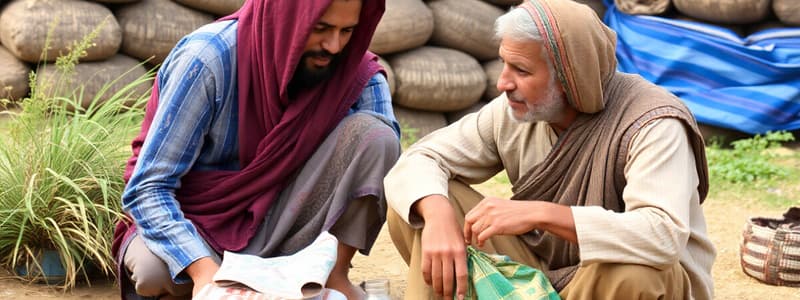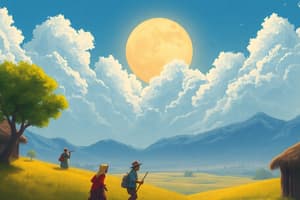Podcast
Questions and Answers
What was Gobar's sarcastic remark about the rich men?
What was Gobar's sarcastic remark about the rich men?
- They enjoy their status.
- They must have a sneaking pleasure tickling their ego. (correct)
- They don't stand for elections.
- They have a lot of power.
Rupa wanted to change her name because she was proud to be silver.
Rupa wanted to change her name because she was proud to be silver.
False (B)
What type of grains do Hori and his family primarily eat?
What type of grains do Hori and his family primarily eat?
Barley
According to Hori, silver is the king of metals and _______ is the servant.
According to Hori, silver is the king of metals and _______ is the servant.
Match the character with their response:
Match the character with their response:
What is the main reason Bhola is in distress?
What is the main reason Bhola is in distress?
Bhola's actions are driven purely by selflessness and a desire to help others.
Bhola's actions are driven purely by selflessness and a desire to help others.
What does Bhola think about the worth of his cow compared to the master's offer?
What does Bhola think about the worth of his cow compared to the master's offer?
The act of __________ the weight of hemp involves moistening it and mixing it with cotton seeds.
The act of __________ the weight of hemp involves moistening it and mixing it with cotton seeds.
Match the following aspects of Bhola's character with their descriptions:
Match the following aspects of Bhola's character with their descriptions:
Flashcards
Fatalism
Fatalism
The belief that one's social position or fate is predetermined and cannot be changed. It often leads to acceptance of hardship and resignation to one's circumstances.
Master
Master
A person of high social standing or wealth, often with significant power and influence.
Sarcasm
Sarcasm
The act of mockingly using a statement meant to praise someone, to express disapproval, or to imply arrogance.
Stiff-necked
Stiff-necked
Signup and view all the flashcards
Brainwave
Brainwave
Signup and view all the flashcards
Small Deceits
Small Deceits
Signup and view all the flashcards
Peasant Selfishness
Peasant Selfishness
Signup and view all the flashcards
Driving a Hard Bargain
Driving a Hard Bargain
Signup and view all the flashcards
Bribing a Peasant
Bribing a Peasant
Signup and view all the flashcards
Inflating Weight
Inflating Weight
Signup and view all the flashcards
Study Notes
Peasant Life and Deceit
- Bhola, a peasant, employs deception in his dealings, perceiving it as a necessity for survival in a harsh environment.
- He prioritizes self-interest over strict adherence to moral codes.
- Bhola's actions highlight the desperation and vulnerability common to rural life.
Bhola's Financial Troubles
- Bhola faces significant financial hardship, lacking fodder for his animals.
- He has been unable to secure a loan from a moneylender.
- He worries about the well-being of his livestock, estimating one maund of straw daily per animal.
- Bhola seeks help from a friend (Hori in this situation).
Peasant's Selfishness and Bargains
- The narrative portrays peasants as fundamentally self-interested, requiring persuasion to help one another.
- Bhola is skilled at negotiation, demonstrating a pragmatic approach to survival.
- Bhola prioritizes his own needs and the well-being of his animals above all else, at times to the detriment of others (like seeking fodder from Hori).
- The author uses dialogue to illustrate the hard and calculated nature of peasants, who are determined yet pragmatic about their needs.
Family Dynamics and Conflicts
- The text describes various family and community conflicts, including arguments between siblings (Sona and Rupa), and the author uses these incidents to highlight the societal norms of the time.
Interpersonal Relationships
- Punia's strong will and resistance highlight her independent nature and resilience to abuse.
- Heera, Punia's husband exhibits rage and acts with considerable force against Punia.
- The author explores the power dynamics between spouses, highlighting the injustices faced by women.
- Hori's paternal role is seen in his interventions in the violence faced by women and family members.
- Relationships between characters are complex, driven by varying degrees of selfishness, compassion, and social pressures.
Gobar and Jhunia
- Jhunia's character represents a woman with sharp insights into human nature.
- Jhunia is described as having a pragmatic approach to relationships with men.
- Gobar is shown as infatuated by her.
- Their interaction demonstrates the complexity of love and societal expectations in a rural setting.
- The interaction between Jhunia and Gobar foreshadows a possible relationship and potentially challenging interactions with the community.
Social Commentary and Class
- The text critiques societal inequalities, exemplified by the differences between peasants and the wealthy.
- Wealth and power are often associated with exploitation; wealthy characters often portray a sense of entitlement and lack empathy for the struggles of the poor.
- The narrative notes examples where wealthy individuals (like Thakur Jhenguri Singh) enjoy a mix of prestige and power derived from their financial success. Their wealth is often juxtaposed with the struggles of commoners.
- The narrative shows the author's perspective on social injustices and the struggles of the less fortunate in society.
Community Events
- The description of the community gathering, emphasizing the social aspects and activities, portrays the village life of the setting.
- The local elite's presence at the gathering highlights their role in the community.
Studying That Suits You
Use AI to generate personalized quizzes and flashcards to suit your learning preferences.




